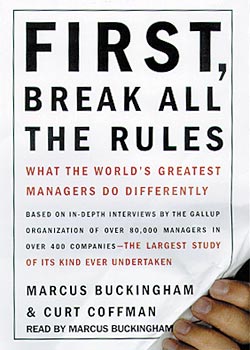
A book about understanding the people you manage, this takes the approach that there’s no processed way to become a productive manager. As many know, the relationship people have with their direct manager affects how long they stay at the company and their overall happiness. Talented managers retain talented people.
A manager’s job is not to manage, but to help their employees. “How can I be of assistance to you today?” The employee is the star, and the manager is the agent, working for their employees. However, a coach/manager means nothing, if he’s not surrounded by talented people. You can only get so far if you don’t have the right people.
The main challenge is working with people’s strengths to get the best out of them. Every person is different, is motivated different, and has their own quirkiness.
One of the really interesting metaphors this book uses though is the development of the brain in our childhood years. Each part of our brain uses connections to stimulate brain activity. It’s like a highway system of cars. If we are more creative in our younger years, these connections grow larger. So, the highway is expanded to a six-lane highway so it can hold more traffic. However, the math skills that have never been used, are still there, but they are left to be stranded as a lonely highway. It can still be used, but the connection isn’t as complex. So, work with the six-lane highways, and quit trying to force a complex highway system on a person that can only manage their single lane. The large highways are the person’s talents.
The other metaphor they use refers to the mountain. Once we start at a new company or a duanting project, it’s similar to looking up at a mountain before the climb. We’re scared. We know there will be danger; it will be cold; and it will be a test of will. But you push forward for the adventure. And the reason we do this? We want to conquer that mountain. We want to stand on top of it and say I was here. That is why we make our climb and move past the intimidation.
The overall insight:
People don’t change that much
Don’t waste time trying to put what was left out.;
Try to draw out what was left in.
That’s hard enough.
Each person is different and needs to be managed differently. Play favorites. Reward some, while not others. A manager is a catalyst trying to find the right chemistry to build this for his employees.
Each person has a select talents: Talents are only recurring patterns of thought, feeling, or behavior.
“They define a talent as ‘a recurring pattern of thought, feeling or behavior that can be productively applied. ‘ The emphasis here is the word recurring. Your talents , they say, are the behaviors you find yourself doing often. Your instinctive ability to remember names, rather than just faces is a talent. Your need to alphabetize your spice rack and color code your wardrobe is a talent. So is your love of crossword puzzles, or your fascination with risk, or your impatience. Any recurring patterns of behavoir that can be productively applied are talents. The key to excellent performance of course is finding the match between your talents and your role.”
I can relate to achievers:
“Similarly, some people have a four-lane highway for constant achievement… They may not have to win, but they do feel a burning need to achieve something tangible every single day. And these kind of people mean “every single day.” For them, everyday -workday, weekend, vacation- every day starts at zero. They have to rack up some numbers by the end of the day to feel good about themselves. The burning flame may dwindle as evening comes, but the next morning it rekindles itself.
Define the right outcomes. And then let each person find his own route toward those outcomes. Guide them to the goal. How they achieve it, is up to them. Building boundaries is good. Be creative within boundaries.
